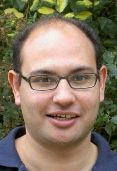University of Reading scientist wins best climate change paper
Release Date 25 November 2010

Dr Simon Gosling from the University of Reading's Walker Institute has been awarded ‘best paper' in the climate change category of the Lloyds ‘Science of Risk' prize.
Dr Gosling was awarded the prize for his paper on climate change and water scarcity published earlier this year. The research demonstrates where there is strong agreement across climate models that river flows will decrease and water scarcity will increase (e.g. western Europe and the Mediterranean) as well as highlighting where there is relatively more uncertainty in how these risks will change (e.g. south-eastern China). The paper was led by Dr Gosling and co-authored with Dr Dan Bretherton and Prof Keith Haines, from the National Centre for Earth Observation and Prof Nigel Arnell, Director of the Walker Institute.
Information about the impacts of climate change is vital to the insurance industry as it allows them to assess changes in the magnitude and location of climate-related risks. Water security has been a focus of Lloyd's emerging risks function for some time, so the context of Dr Gosling's work was highly relevant.
Dr Gosling said: "Understanding the impacts of climate change on water scarcity and flooding is vital for the insurance industry, but my work shows that relying on a single climate model for planning is not appropriate. Knowing where we are more certain and where less certain can help insurers to prepare for the demands of climate change and ultimately could give considerable competitive advantage."
The Science of Risk prize was run for the first time this year by Lloyds to capture scientists' thoughts on how various risks will affect the insurance industry. Lloyds aim to better understand risk to ensure a superior return to investors and to create financial strength. Additionally, Lloyds also want to ensure that insurance pricing fairly reflects the risks posed by various sectors or perils. By getting this right, companies or individuals are incentivised to better manage risk.
The criteria for judging included: relevance to the insurance industry, writing style, financial significance, novelty and quality of research.
ENDS
For more information, please call Rona Cheeseman, press officer, on 0118 378 7388 or email r.cheeseman@reading.ac.uk
Notes to editors:
(1) More details of the Lloyds "Science of Risk" prize can be found here: http://www.lloyds.com/The-Market/Tools-and-Resources/Research/Exposure-Management/Emerging-risks/The-Science-of-Risk/Entries/Category-Winners
(2) ‘Global hydrology modelling and uncertainty: running multiple ensembles with a campus grid ‘SIMON N. GOSLING, DAN BRETHERTON, KEITH HAINES AND NIGEL W. ARNELL. Phil. Trans. R. Soc. A (2010) 368, 4005-4021 doi:10.1098/rsta.2010.0164
(3) The Walker Institute for Climate System Research brings together the unrivalled breadth and depth of climate expertise that exists within the University of Reading - http://www.walker-institute.ac.uk/index.htm
(4) University of Reading is rated as one of the top 200 universities in the world (QS World Rankings 2010).
- The University of Reading is one of the UK's top research-intensive universities. The University is ranked in the top 20 UK higher education institutions in securing research council grants worth nearly £10 million from EPSRC, ESRC, MRC, NERC, AHRC and BBSRC. In the latest RAE (2008), over 87% of the University's research was deemed to be of international standing. Areas of particular research strength recognised include meteorology and climate change, typography and graphic design, archaeology, philosophy, food biosciences, construction management, real estate and planning, as well as law.
- Standards of teaching are excellent - the University scored highly in the National Student Survey 2010. 88% of Reading students responding to the survey stated they were satisfied with the quality of their course.
- The University is estimated to contribute £600 million to the local economy annually.
- University of Reading is a member of the 1994 Group of 19 leading research-intensive universities. The Group was established in 1994 to promote excellence in university research and teaching. Each member undertakes diverse and high-quality research, while ensuring excellent levels of teaching and student experience. http://www.1994group.ac.uk/www.1994group.ac.uk
- More information at www.reading.ac.uk
